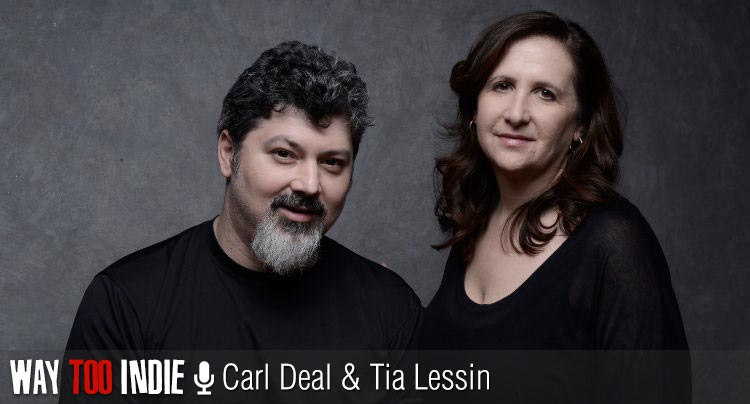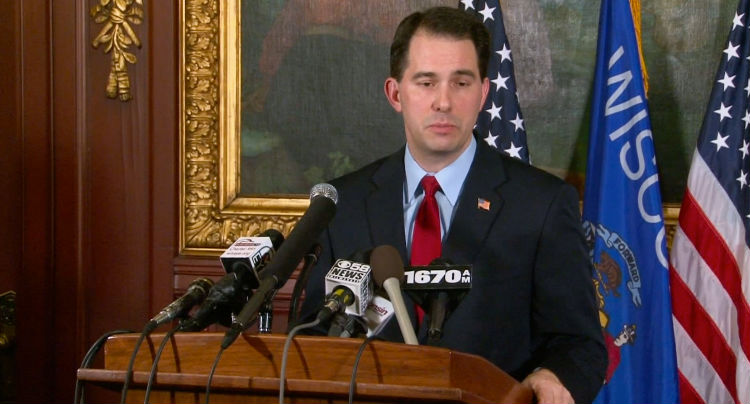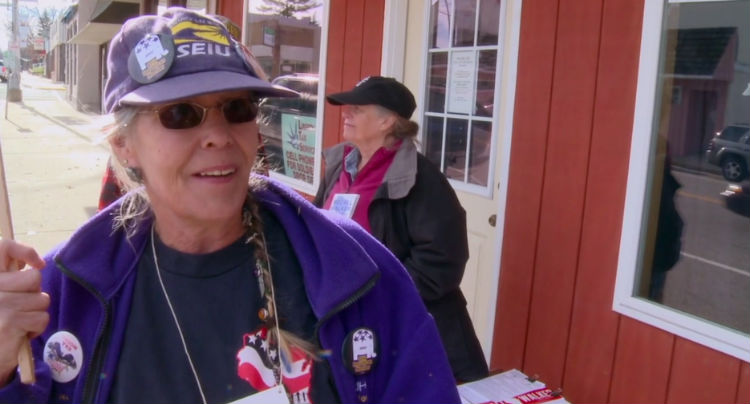Carl Deal and Tia Lessin Talk ‘Citizen Koch’

Bewildered by the results of the Supreme Court’s 2010 Citizens United ruling, which resulted in corporations and labor unions being allowed to spend as much money as they wanted to fund political endeavors, filmmakers Carl Deal and Tia Lessin set out to make sense of it all by making a film about it. Citizen Koch illuminates the dangerous precedent set by the ruling and how it led to corporate money distorting politics and the messages delivered to us, the American people.
Deal and Lessin speak with us about how their experience on previous projects helped them in making Citizen Koch, how following the people helps them follow the money, being removed from a billionaire rally, losing funding for the film due to the same toxic money they cover in the film, and more.

How did experiences like making your previous film, Trouble on the Water, and working on Bowling for Columbine, help you in making Citizen Koch?
Carl: We’ve done work on more traditional PBS documentaries, but also on theatrical films like Michael Moore’s Fahrenheit 9/11. We have high expectations for the impact a film can make, because we saw Fahrenheit 9/11 alter the way people spoke about the President in 2004. Trouble on the Water was a smaller story about one really tough family’s survival of not just the aftermath of hurricane Katrina, but all sorts of institutional barriers to succeeding in this world. With Citizen Koch, we draw on all of those traditions. It’s part expository, telling the backstory of what the Citizens United Supreme Court decision on campaign finance was, but also intimate stories of people caught up in the middle. These are lifelong, moderate Republicans who are trying to find their way in this new political climate that’s awash with money.
Tia: Carl and I had the privilege of working with Michael Moore, who really broke down the doors for documentary filmmakers. From him I think we learned to find humor in otherwise very humorless situations, to follow the money, and to take you places you never thought you could go. We spent a lot of times behind closed doors at the Tea Party and Tea Party rallies. It became a really important part of this film.
What was the importance for you to follow the stories of these people who lost the right to bargain for their wages?
Tia: It’s important to follow the money, and we found out that following these characters helped us to follow the money. It came as kind of a shock to us that Scott Walker’s attack on collective bargaining and public employee unions wasn’t about wages, pensions, or health benefits. He was making a calculated, strategic strike against the funding base for his opponents, for the Democratic party. It turned out, if you look at outside spending, particularly outside spending unleashed after Citizens United, unions are the only folks out there who are spending in the same playing field as the Republican spenders. If you look at the top ten spenders in the 2010 elections, three of them were public employee unions. You get rid of those three, and it’s all red, all conservative. We were struck by that. This was a political calculation on the part of Scott Walker, on the part of the Governors out there, to take out the funding for Democratic candidates. We didn’t hear that from union members or union bosses; we heard that from Karl Rove. He made that strategy very clear, talking about how it would help them in the 2012 elections. I think that was chilling.
By spending time with the Republican public servants on the ground–the VA nurse, the corrections officer, the school teacher–we got to see lifelong Republicans struggling with their own party that was taking aim at them. It was a chance to watch them make hard decisions, and that was an interesting story to us. As important as it is to follow the money, I think following the people is also pretty powerful.
Talk a bit about Palm Springs.
Carl: We knew what interested us was that in 2010 the U.S. Supreme Court had issued this new ruling that blew open the doors for corporate spending on elections. The ruling in Citizens United said that corporations and labor unions could spend unlimited funds from their treasury on elections. Unions have a separate set of rules; they have to disclose all of their spending. After that all happened, we got word that Charles and David Koch had organized a meeting of other billionaires, politicians, and media personalities in Palm Springs in Jaunuary 2011 to lay out the plan of attack for the next election cycle. We thought, “That’s cool! Let’s see what it’s like and see if we can’t get in.” We showed up–Tia was a registered guest at the resort–and there were several thousand protesters at the gates. We weren’t allowed to go in, and Tia was disinvited from the resort entirely. They removed her from the premises.
Tia: I was at the gift shop, and I was about to buy something! [laughs] They raised tens of millions of dollars at that retreat.
How did the process of making the film affect you personally?
Tia: As a filmmaker on the ground, if you’re not passionate about what you’re covering, you might as well find a different story. What really fascinated us about Wisconsin is that it’s a tale of two states. On one hand, it’s the birthplace of public employee unionism. It’s a highly progressive state, the birthplace of the Republican party, which at that time was pretty progressive. On the other side you’ve got Joe McCarthy and the hometown of the John Birch Society. It’s as extreme right as you can possibly get. Some people say it’s a schizophrenic state, but somehow they all live together, side by side. What happened with Scott Walker was that he ratcheted up that tension to the point where people were fighting like it was a civil war.
We were really moved when we saw the throngs of people surrounding the state house when Scott Walker first took aim at working families in Wisconsin. It wasn’t just the union members that were affected by this; it was the cops and firemen who were written out of the bill. It was farmers who had nothing to do with public employee unions. It was students. It was people who thought Scott Walker was taking on the Wisconsin way. How it went from that climate to him getting reelected the next year was what we were interested in seeing.

Something was fishy.
Tia: Usually, the candidate with the most money wins. We wanted to see what that money bought.
The 2012 election obviously didn’t go the Republican’s way, but that strategy of bending and controlling the conversation with money is still going on.
Tia: That’s right. No matter if the candidate wins or loses, you’re shaping public opinion with all that money you’re raising, with broadcast ads…you’re informing and sometimes misinforming the public. Yes, Obama was reelected, but look at the choices he’s made. I think he’s limited in what he can do because people’s understanding of the issues has been distorted by all this money.
Carl: Purely in terms of the Obama reelection, maybe what we saw happen was that the billionaires’ money just neutralized each other. That’s where all the spending was happening.
Tia: We might sound like political junkies, but the way we began making this film was that Carl got addicted to Glen Beck. It’s unusual in our household to have Fox on 24/7, but he couldn’t turn the guy off! It was kind of ruining our relationship! [laughs]
Carl: You’re exaggerating! It was Beck, Hannity, and O’Reilly.
Tia: It was pathetic! It was pathetic. I was like, we need to do something about this. We need to make a film. I think we made this film to make sense of what Glen Beck was doing and saying.
Make sense of it for yourselves.
Tia: For ourselves. We didn’t understand it.
Carl: Do we want to live in a country where the most-watched news station is telling people that Muslims are about to take over America? It’s ridiculous. All this not-so-veiled racism that was pouring out…they didn’t call Obama the N-word, but they called him everything but. It was all so ugly. We were enraged and engaged by that. We wanted to understand where it was coming from.
Tia: We didn’t know at the time, but Glen Beck was getting a million dollars from the Tea Party and the funders of the Tea Party, like the Kochs, to fund the Tea Party. I’m not a conspiracy theorist, but what we try to do with the film is help connect the dots.
How did the issue with Scott Walker, PBS, and ITVS affect you personally?
Tia: We were about a year into filming and well into editing, and we had no idea when we got the funding from ITVS, which is the funding arm of public television, that David Koch was on the board of two big public television affiliates. Not only that, he was a huge donor to PBS. We wouldn’t even imagine he was a donor, because public television seems to go against everything he believes in. [laughs] We were given the green light by PBS, but when the shit hit the fan, they pulled the plug on our funding. We had to go to Kickstarter to close our funding gap.
Carl: I wish that when they had seen David Koch in our trailers, our written materials, our rough cuts, our film, that they had connected the dots for us and said something.
Tia: “Hey guys, the fact that David Koch is a big heavy hitter at PBS is going to make it hard to broadcast your film.” We think it deserves to be seen by the public because it’s a matter of public interest, but we would have found a different way.
Carl: Instead, we had our production thrown into chaos in the last months of finishing the film. It was hard to finish the film in that environment, but more than that, it was very disappointing to begin to understand that his money had such a reach into the decision making at public television. Take the funding out of the equation. That’s important, but ITVS is the gatekeeper to the public audience for independent documentaries. It wasn’t our film; it was Mari Jo, Brian…these voices who had something to say who were prevented from participating in the public dialogue on the public airwaves due to the intimidation of David Koch’s money. Now, does David Koch know about our film? He might know about it now, but he didn’t need to at the time. That’s how powerful the money is.
Tia: Man…it was depressing. Totally demoralizing. We thought long and hard before speaking out about this. It was so clearly wrong and unprincipled. Our film was collateral damage. That’s why we’re so committed to getting this film out there every which way we can.
When I heard the reasons they gave as to why they cut your funding they sounded…silly.
Carl: Not only were they silly: They weren’t true. We feel disappointed that the way we have to engage with ITVS comes down to us having to defend our reputations and restate the truth over and over again. Their statement isn’t true. Our film didn’t change in the ways they claim it changed. Our film had been applauded by ITVS along the way. They saw our rough cut with the title Citizen Koch and liked the direction it was going, three weeks before shit hit the fan. It’s frustrating that they’ve chosen not to engage in a meaningful dialogue.
When the shit did hit the fan and funding was cut, what kept you motivated to keep moving forward with the film?
Tia: When all this was happening, we gave a call to Jane Mayer, the great investigative reporter at the New Yorker, and she did her own research. She helped to confirm the story and fill in a lot of the gaps. When that article was published last May, we got a flood of love and support from people all over the country. Mostly people we didn’t know. They were so outraged. They were PBS supporters who felt so betrayed and let down. All of those comments and the support was a real shot in the arm for us. I think it made it clear that this wasn’t just our fight. We couldn’t give up.
